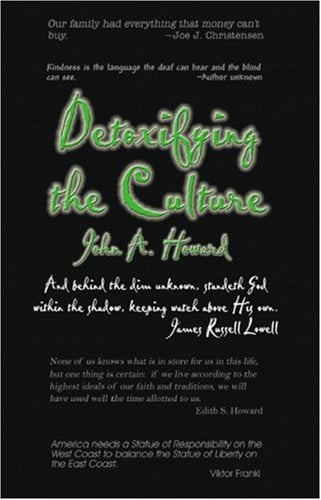In this impressive collection of speeches and essays reflecting decades of somber thought, John A. Howard, senior fellow in educational philosophy at the Howard Center, takes stock of changing American manners and values. What makes these comments especially noteworthy is the distance between Howard’s accomplishments and the irremediably “toxic” culture that he criticizes.
The scion of a distinguished Midwestern family already known for its entrepreneurial and philanthropic activity in the mid-19th century (Abraham Lincoln worked as an attorney on retainer for Howard’s maternal great-grandfather), a Army commander in Europe during World War II, the energetic president of a rising college by the age of 30, and the founder of The Rockford Institute, which publishes Chronicles, John Howard has combined personal merit with social distinctions. Moreover, he has spent his fruitful life in the Midwestern ambiance in which his ancestors and those of his wife had lived and around which their descendants are now settled. In short, he is as far removed mentally from the intruding vulgarity he scorns as one can possibly be.
As a cultural historian, I am struck by the incongruity between Howard’s world and the one that is now besetting us—even more aware of this stark opposition than I was during my years as John Howard’s respectful subordinate at Rockford College in the 1970’s. While, in his only novel, George Santayana poked fun at “the last Puritan,” he admired the human type whose excesses he exposed and from which he himself was descended on his mother’s side. Santayana grasped, as I did while growing up in New England in the 1950’s, that morally serious Protestant patricians were essential for the survival of a free but responsible American society. Deprived of them, or of a group like them, in charge, the United States has descended into the moral wasteland Howard laments in his speeches.
Because of this perception I read with special care Howard’s “Address to the Monday Club of Rockford,” delivered in 1988, about 16 months after I left the city where both of us had lived. His picture of Rockford in the second half of the 19th century and his tender memories of his maternal grandmother, born in 1869, were not entirely new to me. (John had recounted this edifying family history in conversation.) What struck me more than once about the family members evoked, however, was the toughness of the women—their real toughness as opposed to the posturing outrage that the American media identify with their “tough women.” Instead of the rambling therapeutic phrases of Oprah, we find John Howard’s Granny preparing for his mother “passages of inspiration and reassurance” containing the bracing prose of John Bunyan. In contrast to my female students who are endlessly exhorted to “like yourselves,” John’s mother was taught: “Therefore what God says is best, indeed is best, though all the men in the world are against it.” So far from being told to “feel good about yourself” (a message that my colleagues and I are expected to send to every student), the Howard matriarchs were reminded of Marcus Aurelius’s precept: “The perfection of moral character consists in passing each day as if it were the last.” John Howard’s ancestors were not the types my students and colleagues would call “fun people,” but somehow they seem more real as human beings than the plastic, politically correct hominoids who have taken their place.
My one criticism of these eloquent, earnest diatribes is that they don’t go far enough in showing how dramatically this society has fallen. We are left with the hope that somehow certain civic leaders can turn the situation around, drag children away from TV sewage, and pour wholesome teachings into those poisoned by drugs and parental neglect. In my opinion, such moral uplift is possible only if linked to the kind of people John Howard presents as his ancestors and those who inhabited, in its early years, the northern Illinois community that he portrays.
Some 25 years ago, after listening to an advocate of “enlightened self-interest” prattle on about how greed is beneficial for republican liberty, John turned to me and noted quite properly, “It is character, not greed, that protects us!” To this, all that need be added is that it is entire societies that create the character John Howard believes to be foundational for free government.
[Detoxifying the Culture, by John A. Howard (Baltimore: AmErica House) 188 pp., $19.95]

Leave a Reply